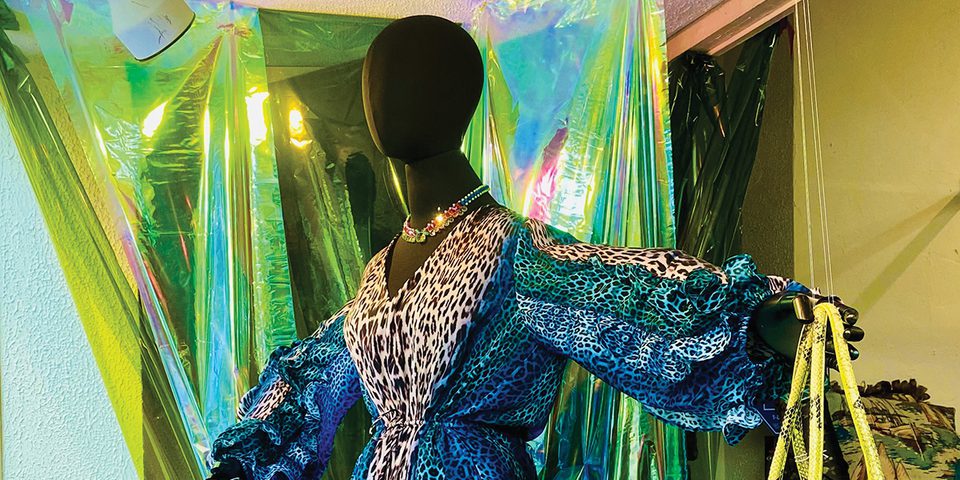Window Shopping for Science

Dr. Miguel Brieño-Enríquez loves to make people beautiful, from the inside out.
During the weekdays, Miguel, as he prefers to be called, is a researcher focused on reproductive aging at Magee-Womens Research Institute (MWRI). His work examining the fertility of the naked mole-rat — a creature that can live up to 37 years and reproduce throughout the entire course of its lifetime — explores how we might expand the reproductive window for human beings.
On the weekends, he heads from the lab in Pittsburgh’s Oakland neighborhood to a shop in nearby Bloomfield where he ignites his flair for another passion: fashion.
Miguel regularly creates eye-catching window displays featuring the hottest items at The Clothes Line: a resale shop run by The Women’s Auxiliary group, which is dedicated to giving back to MWRI. With the wares supplied by ongoing donations from dedicated donors and the staff comprised of volunteers, The Clothes Line offers clothing for everyday wear as well as luxury and designer items.
As Peggy Snavely, president of the Women’s Auxiliary explains, the group usually raises about $100,000 a year that goes back to Magee. She credits the team of volunteers from the Women’s Auxiliary that staff the store, and the donors who continuously provide generous donations to the shop, for the store’s mission-driven success and laid-back atmosphere.
“It’s fun to get to know people, clean out your closet, and raise money for Magee,” Peggy says.
Some brand-new donated pieces have price tags in the thousands of dollars but sell for a fraction of that at The Clothes Line. Funds from clothing sales support Women’s Auxiliary programs like Magee Auxiliary Research Scholar (MARS) and the Bright Star Award, which give newer MWRI researchers like Miguel a boost of funds to help them establish their initial data.
While Miguel, who grew up in both Mexico and Spain, volunteers his time for The Clothes Line, he also has professional experience designing window displays.
“I used to have a store in Barcelona — a clothes store — and we designed one-of-a- kind gowns and purses and things like that. So, it’s something that I always liked,” Miguel says. He discovered The Clothes Line after moving to Pittsburgh and asked if he could help.
“So lucky me, because ... they said ‘OK, let’s go.’ And every time they give me a little bit more freedom to do stuff. I enjoy working with the clothes they have,” Miguel says.
“Like really high-quality, high-end fashion clothes, brand new, with the tags.”
When it comes to running The Clothes Line, Peggy is quick to applaud Betsy McAleer and Mary Lou Gatewood for being the true “powerhouses behind the operation.” With the support of Women’s Auxiliary volunteers, Betsy and Mary Lou manage the donations, inventory, promotions, and day-to-day operations of the shop — a behemoth task.
Along with “The Ladies,” as Miguel affectionately refers to them, most Saturdays you can find Miguel changing out The Clothes Line front window with a new themed display, featuring one to two mannequins decked out in seasonal clothes and surrounded by vibrant accoutrements. From Pride month to the jungle to Christmas and Valentine’s Day, the changing displays draw in new customers and passersby, helping even the most unique pieces, like a kimono, get scooped up quickly.
Miguel enjoys interacting with the customers, too. While he’s at it, Miguel takes the opportunity to educate customers about his research and thank them for supporting him through their purchases. Peggy, Betsy, and Mary Lou all agree that the collaboration has been beneficial for The Clothes Line, and they appreciate Miguel’s dedication to the craft.
“I can’t tell you how much we love Miguel,” Peggy says. “He’s just been such a delight to have. He’s got this flair [for the windows] that we’d never be able to do.”
Miguel adds that his being at the store helps them know where their money is going and humanizes him as a scientist for the patrons.
“It’s perfect because it makes them understand that the money is going to someone real, something that is related to research, but that researchers are not these weirdos they look like in the movies,” Miguel says, with the caveat, “Well, I’m weird, but not like in the movies.”
However, Miguel almost pursued Hollywood-style dreams: before focusing on reproductive science, Miguel planned to go into plastic surgery — or making beautiful people.
“I was young and saw life in a different way,” Miguel says. “Plastic surgery is amazing, but it is not the way I see myself trying to change people’s lives.”
So, Miguel decided to pivot his work to making people healthy as its own form of beauty. “You can impact how to protect people, to give them the best life span possible or health plan, and also it is something that really fulfilled me,” he says.
Miguel’s work at The Clothes Line links his reproductive aging research at MWRI to his love for fashion and aesthetic design and has made Pittsburgh feel a little more like home. Describing his relationship with The Clothes Line staff, Miguel says: “In this sense I have a community with all the ladies, and they care about the science. They care about the research. But in my case, they also care about me as a person.”